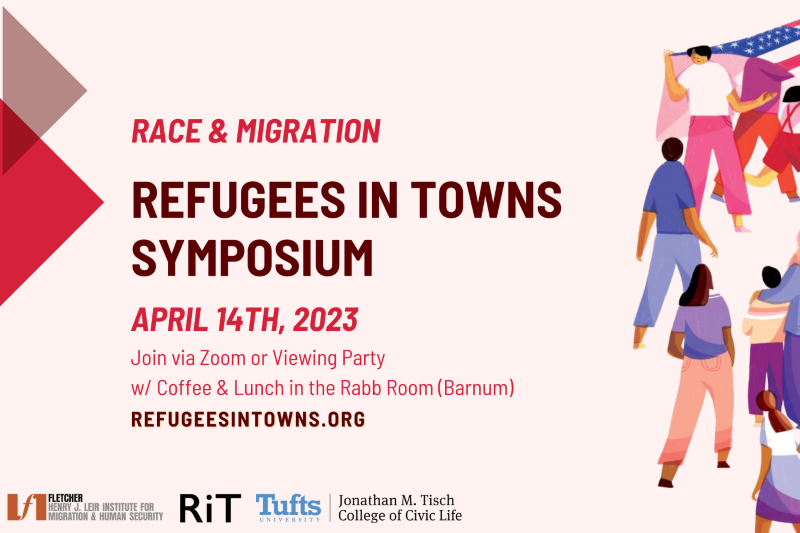-

Hear from Professor Monica Toft
Learn how Professor Monica Toft is shaping the study of global affairs and diplomacy at Fletcher.
Hear from Prof. Toft -

Explore Fletcher academics in action
Fletcher Features offers insights, innovation, stories and expertise by scholars.
Get global insights -
Get application tips right from the source
Learn tips, tricks, and behind-the-scenes insights on applying to Fletcher from our admissions counselors.
Hear from Admissions -

Research that the world is talking about
Stay up to date on the latest research, innovation, and thought leadership from our newsroom.
Stay informed -
Meet Fletcherites and their stories
Get to know our vibrant community through news stories highlighting faculty, students, and alumni.
Meet Fletcherites -

Forge your future after Fletcher
Watch to see how Fletcher prepares global thinkers for success across industries.
See the impact -

Global insights and expertise, on demand.
Need a global affairs expert for a timely and insightful take? Fletcher faculty are available for media inquiries.
Get in Touch
A Ground-Up View of Race and Integration
Leir Institute Hosts Refugees in Towns Symposium

How do refugees learn about race in the United States? What is their experience with race and racism once they arrive?
Founded by Professor Karen Jacobsen in 2017 in response to rising anti-immigrant rhetoric in the U.S. and abroad, the Refugees in Town (RiT) project was designed to understand urban integration through the perspectives of refugees, returnees, IDPs, other migrants, and their hosts by asking them to write about their own experiences in the towns where they live. Through local perspectives, the RiT project has sought to develop a ground-up view of what enables and inhibits integration in towns around the world.
On April 14, the Henry J. Leir Institute for Migration & Human Security will host the Refugees in Towns Symposium, drawing from RiT’s research with the Hello Neighbor Network. This research was begun and led by Professor Jacobsen and was funded by Tisch College. RiT researchers will present their findings on how refugees in the U.S. learn about race and racism. Providing space for both practitioners and migrants to speak, the conference will explore how organizations and advocates can foster welcoming communities and expand resettlement programming that promotes racial understanding.
“Our study was focused on learning about how refugees learn about and or replicate racism and ideas about race before their journeys, during their journeys, and post-arrival,” said Lucy Mastellar F23, a MALD student and one of the RiT researchers.
Mastellar was part of a team that traveled to Mobile, Ala., where she worked with a partner organization, Dwell Mobile, and interviewed refugees about their journeys and experiences.
“Post-arrival, interactions with local people, and refugees’ own experiences of racism informed their perception of race in the U.S.,” said Mastellar. “Pre-arrival, most refugees learned about racism and race via word-of-mouth, media, and social media.”
The refugees the team spoke with tended to have a heightened awareness of racism if they’d come through a refugee camp. Fluency in English and education-level were also strong predictors of refugees’ knowledge of racism.
Speaking to Afghan refugees in Pittsburgh, Pa., where another group of researchers partnered with the Hello Neighbor Network, researcher Yumeka Kawahara F23 noted additional nuances.
“Ethnicity matters more than we thought,” said Kawahara. “For Afghan refugees, Hazara and other ethnic minorities think of racism in a different way. Hazaras tends to face discrimination in Afghanistan, so when they come to the U.S., they experience both American racism and discrimination from their own community.”
“We’re continuing this conversation with refugees who are community leaders across the U.S. to see if our findings ring true for them,” said Charlie Williams F23, who also worked on the Pittsburgh team. “Continuing to have refugee voices reflecting on this study and giving feedback is really important to how Leir fulfills its mission.”
Research at Leir employs local and human security lenses, and the symposium will provide additional opportunity for commentary from the community.
“We’re hoping this is a space where practitioners, advocates, and educators can come together to discuss solutions,” said Mastellar, “as well as a space for refugees to talk about their own experiences and understand their voices are heard and their concerns will be addressed.”
“Even though our research was primarily about how refugees learn about race, a huge aspect of how refugees learn about race is through their own experience with racism,” she added. “This conference, in addition to highlighting how refugees learn about race, will highlight the experiences refugees and all migrants endure in the U.S. and in transit, and hopefully garner a greater awareness of the struggles many face on a daily basis. Hopefully we can spark dialogue through this conference on how we can change the narrative in our local community.”
To this end, Williams is particularly looking forward to the practitioner panel. Moderated by State Department Fellow David Muehlke and featuring practitioners in Boston, the panel will offer insight on what’s happening in Fletcher’s neighborhood.
“A lot of our conversations really depended on what context refugees are coming from, what identities they hold themselves, and the places they’re being settled,” said Williams. “I hope the symposium continues the conversation and fosters reflective practice.”
Kawahara added that this RiT research is important for both practitioners and academics.
“When we started, we couldn’t find a lot of relevant, previous research,” she said. “Our research is quite new, and there is space for others to use it.”
The event will be fully online with a viewing party and lunch for the local community. Register for the symposium.

